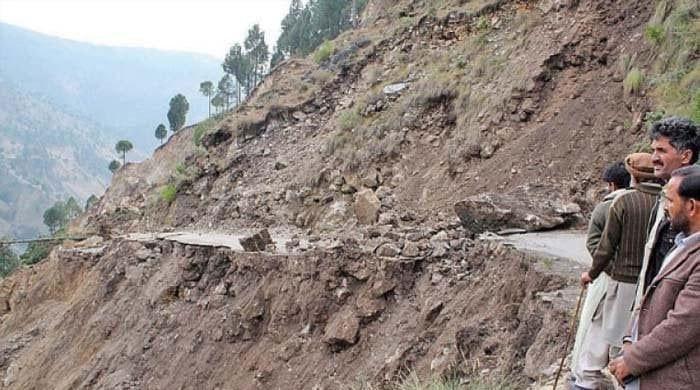- AJK Govt closes schools for two days due to showers.
- In Gilgit, the floods damage the main power plant of Naltar, explains DC.
- People living near the banks have evacuated on the basis of the risk of flooding.
Muzaffarabad: At least ten people, including women and children, died Thursday while the heavy rains sparked sudden floods and landslides through the Gilgit-Baltistan and certain parts of Azad Jammu and Kashmir (AJK), officials said.
At the AJK, the government announced the closure of public and private schools on August 15 and 16 due to heavy continuous rain and the risk of landslides.
One day earlier, the Pakistan Meteorological Department (PMD) had warned against the monsoon activity with more widespread rains, the wind and the allowances expected in several parts of the country compared to next week.
According to forecasts, Islamabad, Azad Jammu and Kashmir (AJK), the superior punjab, the Khyber Pakhtunkhwa (KP) and the Gilgit-Baltistan are likely to receive falls of rain and speeds with heavy falls dispersed from August 14 to 17.
In Gilgit-Baltistan, eight people were killed and two more injured in the Ghizer district, said that government spokesperson GB Faizullah Firaq, adding that a brother and a sister are dead and that two other injuries in the Diammer district.
He said several roads damaged by the floods are being repaired, adding that the key roads, including the Babusar road, had been restored to Loshi Point and Karakoram Highway in Gandlu Point. “”
Rescue operations are underway in the areas struck by the floods, he said.
In Gilgit City, the floods damaged the main power station in Naltar, plunging the area into the dark, said the assistant commissioner, adding that residents living near the River based on the river were moved to safer places given the risk of flooding.
In Athmuqam, the landslide debris were authorized on the Neelum Valley road to Barian Seri, restaurant access, said local police.
In Chilas, the water flow in the Indus river has risen to Soniwal Kot, a village located at the junction of the Indus and Thurnala river, flooding nearby colonies and damaging several houses, local residents said.
In Muzaffarabad, AJK Prime Minister, Chaudhry Anwar Ul Haq, chaired a meeting of the State Disaster Management Authority (SDMA) and ordered the relocation of residents living along the banks in safer places.
During the meeting, the Prime Minister also approved financial assistance for families affected by the rain and ordered that housing is provided to those whose houses have been destroyed.
The HAQ PM has issued orders to take measures for the protection of residents along the Jhelum river in Hattian Bala.
He ordered the authorities to assess damage to electrical infrastructure in Jhelum, Neelum and Bagh, and told the Department of Electricity to submit a detailed report.
The Prime Minister also ordered the creation of emergency control points to monitor water resources. The meeting he chaired also agreed to launch an operation to eliminate encroachments along the banks.
In the Neelum district, two bridges in Kutten and three bond bridges on the Lawat stream were swept away by floods, according to the SDMA.
The SDMA said that several tourists remain blocked at the Ratti Gali base camp. Partial food was restored from the Noseri network station, according to engineer Sikandar Khan.
Meanwhile, the Minister of Information Mazhar Saeed, speaking in a video message from the Tourist Point de Ratti Gali in the Neelum Valley, said that more than 700 tourists, including more than 300 women and children, were blocked after a Cloudburst won sections of the road.
Due to bad weather, he noted, the authorities prevented tourists from leaving the region and organized free accommodation with the help of local residents.
Any decision on the departure of tourists from Ratti Gali will be made this morning once the weather is over, he said.
The recent Mousson season has wreaked havoc through Pakistan, causing widespread floods and landslides that have cost more than 260 lives on a national scale. The Gilgit-Baltistan, a key tourist region, was seriously affected. Head Minister Haji Gulbar Khan reported at least ten deaths and significant damage to houses, water canals and roads.
Prime Minister Shehbaz Sharif recently visited the region, distributing remuneration checks as part of a 4 billion rupered rescue, ordering an urgent restoration of infrastructure. He prayed for the injured and promised continuous support for affected families.
Stressing the growing threat of climate change, the Prime Minister underlined the urgent need for early alert systems and announced plans for a solar energy project of 100 megawatts in Gilgit-Baltistan to strengthen the region’s energy supply.
The PMD warned of sudden potential floods in local streams and dumpers in KP, Punjab, Islamabad, Murrier, Galliyat and Ajk from August 15 to 21, and in hill torrents from DG Khan and eastern Balutchistan from August 18 to 21.
Urban floods are possible in the low areas of Islamabad, Rawalpindi, Gujranwala, Lahore, Siackot, Peshawar and Nowshera, said the Met Office.
Field landslides and mud shifts can disturb the roads in hilly regions, while wind storms and lightning could damage weak structures, electric posts, display panels and vehicles.
Meanwhile, the provincial Punjab Disaster Management Authority (PDMA) issued an alert for the seventh rainy fate of Mousson from August 13 to 15, warning of strong showers in Rawalpindi, Gujranwala, Lahore and Dera Ghazi Khan.
Heavy showers are also planned in the upper part of the Industry rivers, Chenab, Sutlej, Jhelum and Ravi.




